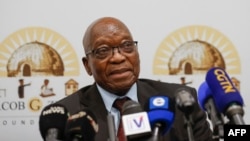South Africa's scandal-embroiled former president, Jacob Zuma, addressed the media Saturday for the first time after completing a 15-month jail term for contempt of court, alleging the country's justice system is unjust and infiltrated by foreign interests.
Zuma, who has faced myriad corruption allegations, also had failed to appear in front of an inquiry into state graft — locally called “state capture” — that occurred under his nearly decadelong tenure.
Yet, Zuma told the press he had been unfairly imprisoned without a trial, despite the fact he was summoned and failed to appear before the inquiry. Analysts say Zuma is refusing to acknowledge the validity of the inquiry, essentially attempting to portray the presiding judge as leading a witch hunt for the former leader.
Zuma said the country’s justice system has been “infiltrated” by both international interests and the interests of sympathizers of the former racially segregated apartheid regime.
Zuma also claimed the judge presiding over the inquiry, Chief Justice Raymond Zondo, had unfairly targeted him and his allies to distract the public from the country’s real issues.
At the time of his arrest in July 2021, protests led by his supporters in his home province of KwaZulu Natal spiraled into riots around the country that resulted in millions of dollars in damage to infrastructure and stolen goods.
Police said earlier this week that one of Zuma’s daughters remains under investigation for inciting the unrest.
Zuma spent just three of the 15 months behind bars, and he was released on medical parole for an undisclosed condition.
On Saturday, Zuma didn’t provide any evidence of so-called infiltration of the country’s courts — which are viewed by many as the strongest institution for averting otherwise widespread corruption.
Instead, Zuma blamed, but didn’t name, the country’s leadership for selling out the judiciary and the constitution to “global commercial interests.”
The allegations come just two months ahead of the convention of the ruling African National Congress party, where current President Cyril Ramaphosa, who is politically at odds with his predecessor, Zuma, is expected to face fierce competition to retain party leadership.




